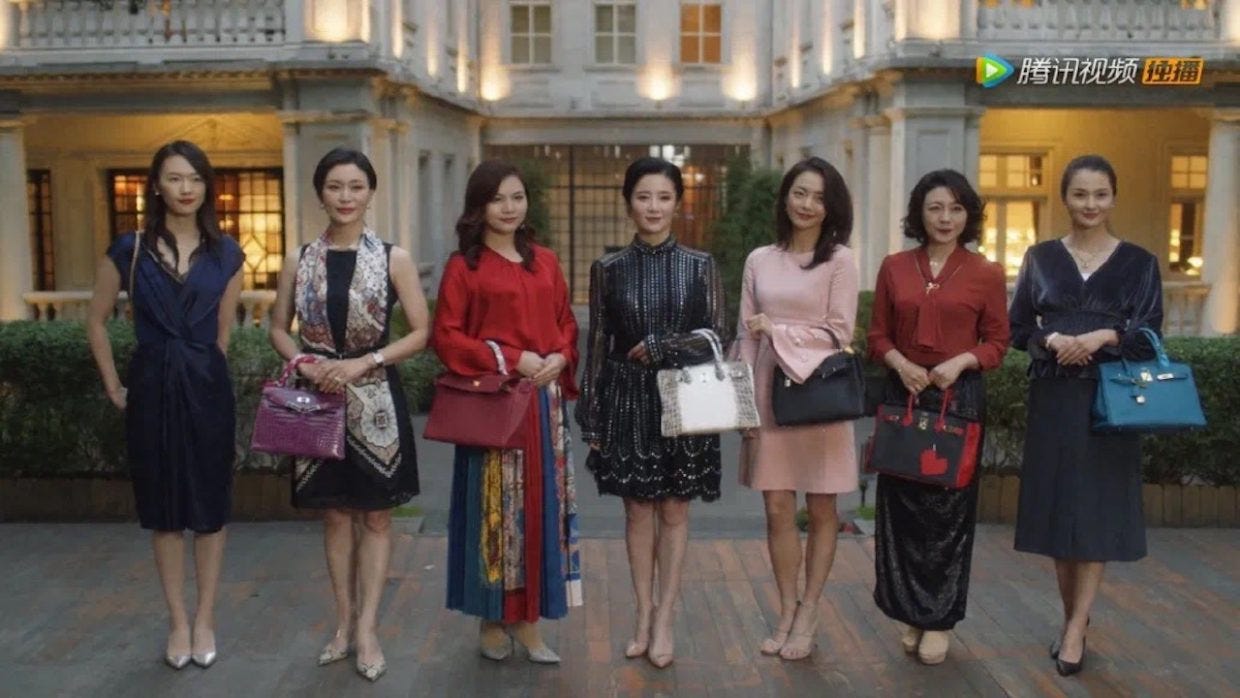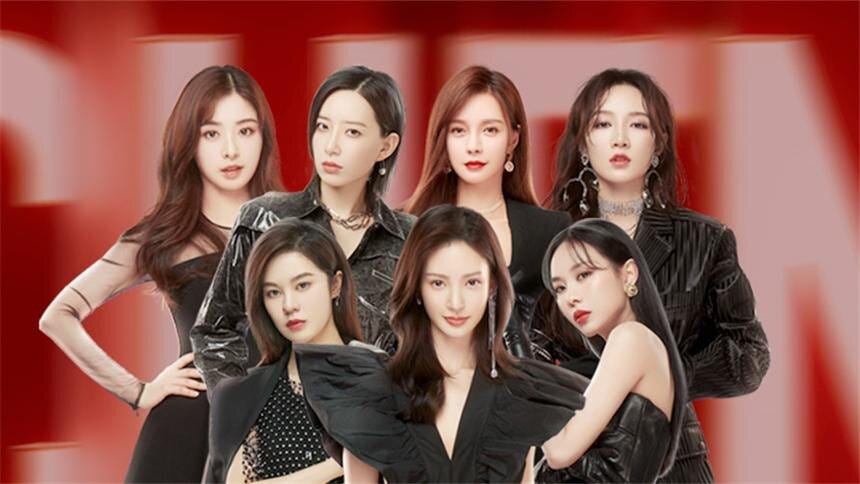The Secret Weapon For Brands in China: Thirtysomething Women
Plus: Next-level livestreaming, reality TV's hot summer, and Vivo on the big screen.

The valuable consumer demographic of women over the age of 30 is firmly in the spotlight this summer thanks to two hit shows: Mango TV’s idol group competition show “Sisters Who Make Waves” (乘风破浪的姐姐) and Dragon TV’s new drama “Nothing But Thirty” (三十而已, also available on Tencent Video), with brands seeing notable impact as a result.
“Sisters” has put a new spin on the popular format used to form new pop groups by featuring a cast of established celebrities ranging in age from 30 to 52, a marked departure from the young and unknown hopefuls who typically populate such shows. “Nothing But Thirty” is a women-centered series with three protagonists from different walks of life — a high-end department store saleswoman, a socially ambitious stay-at-home mom, and a free-spirited writer — as they approach the age at which their “value” is seen as declining.
The C-beauty brand Thanmelin has been a big winner as the title sponsor of “Sisters,” with its products featured heavily throughout the show as contestants use its premium skincare line on a regular basis. But even brands that are not affiliated with the shows are reaping benefits. Even as fans have pointed out the privileges enjoyed by the well-to-do contestants on the show, such as luxurious accommodations that put to shame the sparse dorm-like options offered to participants on other idol competitions, the designer fashions seen on the program have sparked fervent social media commentary and searches for similar looks from brands such as Alexander Wang, Moschino, Miu Miu, and Fendi.
Similarly, viewers of “Nothing But Thirty” have sought out styles from the show from sellers on Taobao, even though it is not associated with the show. While the drama’s target audience has appealed to numerous sponsors, including fashion e-commerce platform Vipshop, Lancôme, and Cadillac, the biggest beneficiary so far has been the French luxury goods house Hermès, thanks to a storyline from the show that has sparked viral online discussions.
One of the main characters, played by Yao Tong, carries a limited-edition Chanel purse from 2017 to attend a gathering of wealthy housewives, an apparent social faux pas in a room full of women with highly coveted Hermès Birkin and Kelly bags. Later, she notices that she has been cropped out of a group photo in which the others are proudly displaying their handbags, setting her off on a desperate search to obtain her own Hermès so that she can fit in, with the lavish expenditure becoming a source of tension in her marriage. The signature Hermès styles are so well known that the brand is never even mentioned by name, but it has become a hot search topic on Weibo, as viewers both drew attention to how luxury bags are used to define social status in China today and searched for the exact models seen on the show.
Other brands without official sponsor links to the new wave of 30+ women’s programming are aiming to reach their target audiences with content that encourages a celebration of the milestone, instead of treating it as a number to dread. The online meal-kit service Missfresh recently released a short film, “Making Life Fresher” (让生活更鲜活) that asks, “What is the state of life after 30+?” It pushes women to embrace self-confidence as it introduces the brand’s fresh ingredients as a selling point. Eagle-eyed fans of “Nothing But Thirty” have spotted Missfresh grocery bags making a cameo on the show even though it is not listed among the sponsors, highlighting another instance of how the series’ creators have sought to use realistic product placements.
Interest in inspirational content about women over 30 is on the rise, with the story of the e-commerce livestreamer known as Weiwei being hailed as a real-world version of “Nothing But Thirty.” After leaving a white-collar job to become a professional host on Taobao Live, Weiwei struggled during her first year in the industry, but eventually found a niche in food-related livestreaming and partnered with farmers to share their products with a broader audience. Now her income is reportedly 10 times that of her previous job, highlighting the power of persistence and the ability to succeed in the fast-growing e-commerce livestreaming sector.
- by Ginger Ooi, CCI Team
Mentioned in today’s newsletter: Absolut Vodka, Alexander Wang, BMW, Cadillac, Coca-Cola, Dragon TV, Fendi, Hennessy, Hermès, IWC Schaffhausen, Lancôme, Lexus, MAC Cosmetics, Mango TV, Mercedes-Benz, Missfresh, Miu Miu, Moschino, Pepsi, Tencent Video, Thanmelin, Vipshop.

Register today to join Jing Daily and Content Commerce Insider on Wednesday, August 5 at 11:30 A.M. ET / 4:30 P.M. CET for a live webinar exploring “Next-Level Livestreaming: How Brands Can Profit From China’s Top E-Commerce Trend”.
Speakers include CCI editorial director Sky Canaves, Jing Daily editor-in-chief Enrique Menendez, fashion designer Masha Ma, and influencer/KOL Anny Fan.
During the hour-long broadcast, we’ll discuss how e-commerce livestreaming will continue to play a critical role in China’s luxury retail sector post-Covid-19 and beyond. In our discussion, you’ll learn about successful luxury campaigns, e-commerce livestream trends, and hear first-hand livestream experiences from market experts.
Don’t miss out! Register by clicking the button below.
Beauty Brands and Luxury Automakers Get in on China’s Hottest Reality Shows

China’s peak summer TV season is finally in full swing, following a roughly month-long delay as a result of the coronavirus and the postponement of the all-important college entrance exams (because no teenagers will be watching TV in the critical run-up to the big test).
This year, some of the most highly rated shows are new seasons of trend-based competitions produced by the major video streaming platforms: iQiyi’s rock-focused “The Big Band” (乐队的夏天), Tencent Video’s “Superband” (明日之子), and Youku’s “Street Dance of China” (这!就是街舞) which brings together top idols Wang Yibo, Lay Zhang, and Jackson Wang as mentors.
Brand presence on reality TV is constantly shifting, with even the most successful shows rarely seeing the same sponsors return as the fees for popular series rise and marketers hunt for the next new thing. According to Media360, July saw the release of 11 new reality shows by video streaming platforms, with Tencent Video accounting for seven, which drew a cumulative 59 brand sponsorships.
Beverage brands (including alcohol) have dominated the sponsor ranks, accounting for about half of the title sponsorships. Among them are global brands Pepsi (“Superband”), Coca-Cola (Tencent’s “Supernova Games,” 超新星全运动会), and Absolut Vodka (“720 Trend Manager,” 720潮流主理人, also on Tencent).
While reality show sponsorships have long been targeted by international brands in the fast-moving consumer goods sector, we’re starting to see more involvement from premium brands, especially as programming diversifies to serve more niche audience groups. Luxury automakers Mercedes-Benz and BMW are sponsoring “Street Dance” and “The Big Band,” respectively, with planned brand integrations that will extend beyond the screen into offline performances and other events.
Global beauty brands are also taking on a more prominent role in the latest crop of shows. MAC Cosmetics is a sponsor of “Street Dance,” where it can leverage the following of its celebrity ambassador Lay Zhang to develop additional content related to the show’s IP, such as e-commerce livestreams. And skincare brand Helena Rubinstein is the title sponsor for Tencent Video’s “Women 30+” (女人30+), tapping into the rising trend for content centered around this valuable “mature” female demographic.
The CCI Take: China’s Competition Show Boom

This week, Content Commerce Insider is launching a new ongoing series, “The CCI Take,” that will highlight our opinion on one key trend per week that is currently shaping the Chinese — and increasingly the global — market.
First, we turn to a trend that is impacting the marketing strategies of many domestic and foreign brands: the rising tide of competition reality television programs in China centered around specific topics.
While competition reality shows are nothing new in China — early examples include shows adapted from Western or Japanese formats such as the singing competition program “Super Girl” (2004-2006) and dating show “If You Are the One” (2010) — they have become exceptionally popular in recent years, with 2020 proving a pivotal year.
Read the full article on Content Commerce Insider.
Brand Film Pick: Vivo on the Big Screen at the First International Film Festival
Few industries have been more affected by the pandemic than movies. In addition to cinema closures and production delays, film festivals across the globe have been forced to postpone or move online as a result of ongoing coronavirus-related restrictions on travel and events. The First International Film Festival is only the third in-person festival to be held since the coronavirus pandemic started, scheduled to run from July 26 to August 3 in the city of Xining in Qinghai province, high atop the Tibetan plateau.
The festival has attracted support from many global sponsors, including luxury brands such as Hennessy, Lexus, and IWC Schaffhausen. In recent years, Vivo, one of China’s leading smartphone makers, has increased its efforts to improve and market the video features of its devices. The First International Film Festival presents a clear opportunity to promote its latest developments to a young, international filmmaking audience.
As an official strategic partner of the First Youth Film Festival and the co-sponsor of the festival’s ultra-short film unit, Vivo hosted a competition for young artists in early June this year. The contest encouraged creators to use their Vivo phones to produce a short film, aiming to showcase the potential for mobile phones to enable movie creation. In addition, Vivo sponsored the Yang Qing film, “Miss You on the Missed Night” (当我们决定放弃的夜晚) — shot entirely on the new model Vivo model X50 Pro+ — which will be featured as the opener of the ultra-short film unit on July 31.
“Miss You on the Missed Night” takes place on a seemingly unremarkable city street corner, slightly obscured by heavy traffic and flanked by a pile of bicycles. The film tells the emotional story of a daughter, Xiaomei, who moved to the big city to make a living, but plans to return home after losing her job. Meanwhile, her recently widowed father moves to the city after his own business falters. Neither father nor daughter can find the courage to share their struggles with the other, but by chance, they each seek shelter from a storm in the same restaurant. Two adjacent windows give viewers a shared vantage point of both family members, facing opposite directions, contemplating how to talk to each other.
The remainder of the film is shot from this position, with a group of diners entering the restaurant and passing both windows, and a car driving by the storefront. A lamppost provides a line of symmetry between father and daughter, symbolizing their feelings of detachment and isolation. Following the moments of despair, the rain eases. Xiaomei exits the restaurant determined to find a new job and make it on her own, and her father soon follows, resolved to return to his hometown and restore the family business. As the film concludes, Xiaomei calls her father: "Dad, just now I suddenly felt very close to you.”
The film makes subtle references to the power of Vivo’s products to keep loved ones connected, whether near or far. However, the leading role goes to the Vivo X50 Pro+ as a partner in the production of the film itself. The entire short was shot at night and in rainy conditions, but the phone’s 4K high-definition picture and long-lens allowed for a crisp finish. By achieving the cinematic quality characteristic of all the other films competing at FIRST, Vivo draws attention to the full potential of its digital technologies.
- by Ben Guggenheim, CCI Team
Report Corner

C-beauty brands Pechoin and Perfect Diary lead the Kantar Worldpanel rankings for most-chosen skincare and makeup labels in the Chinese market.
Amid increasing optimism about the post-coronavirus future, 51% of Chinese consumers rate “value for money” as an important factor influencing their purchasing decisions, a much lower rate than in other major global economies, according to a survey by KPMG.
News in English
Alibaba’s Tmall Innovation Center is the subject of a case study on agile consumer product development co-authored by Harvard Business School Executive-in-Residence Daniel O'Connor. Alizila
A mid-year report from Quest Mobile on China’s mobile internet finds that mini-programs within apps are a major source of growth in the sector and have become a must-have feature for many big-name apps beyond WeChat. Technode
One of Beijing’s oldest and most popular shopping districts is looking to the future through a partnership with JD.com that aims to incorporate the design of a “digital commercial street” into a WeChat mini program. JD Corporate Blog
The virtual 2020 China Fashion Gala was livestreamed from New York City on July 23, drawing 1200 guests from around the world to raise $600,000 to benefit China Institute programs. WWD
Although the Chinese language lacks an exact equivalent to the concept of “wellness” in English, consumers are increasingly focused on their physical, mental, and spiritual health as a result of the coronavirus pandemic. Glossy
Chinese style goes global as the stylish citizens seen on the street become the latest TikTok trend. Vogue
Robust demand for luxury cars continues to drive China’s auto market recovery, surging by 27% in June and accounting for a record 14.8% of total passenger vehicle sales for the month. Caixin
We’ve Got China Covered


